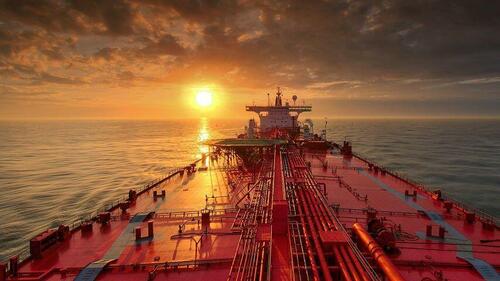
In a remarkable development, and at a moment European retailers and factories are beginning to bear the brunt of the global shipping chaos and soaring Red Sea transit risk, the Houthis have declared safe passage for Russia and China.
A senior Houthi official, Mohammed al-Bukhaiti, mentioned these US rivals by name in an interview with the Russian outlet Izvestia on Friday. "As for all other countries, including Russia and China, their shipping in the region is not threatened," he said, stipulating this will remain as long as they are not linked to Israel or its supporters.

"Moreover, we are ready to ensure the safe passage of their ships in the Red Sea, because free navigation plays a significant role for our country," he added, but then underscored that attacks on ships will continue if they are "in any way connected with Israel."
The spokesman went on to blame the Red Sea crisis on Israel's (and its backers) refusal to reverse course in Gaza, given its aerial and ground campaign as continued. "Ansar Allah [the group's formal name] does not pursue the goal of capturing or sinking this or that sea vessel," he claimed. "Our goal is to raise the economic costs for [Israel] in order to stop the carnage in Gaza."
Some of the vessels which have come under attack thus far actually have connection to dozens of countries, but ships with Russian or Chinese ownership, or deep ties, have yet to be attacked.
Another Houthi official told Reuters separately that the group doesn't seek to expand its campaign, after a fragile peace took effect with Saudi Arabia and the EUA concerning the Yemeni civil war:
Yemen’s Houthis have said they do not intend to expand their attacks on shipping in and around the Red Sea, beyond their stated aims of blockading Israel and retaliating against the US and Britain for airstrikes.
In an interview with Reuters, spokesperson Mohammed Abdulsalam, who is also the chief Houthi negotiator in peace talks over Yemen’s decade-old civil war, said the group had no plans to target its longstanding foes Saudi Arabia and the United Arab Emirates.
“We do not want the escalation to expand. This is not our demand. We imposed rules of engagement in which not a single drop of blood was shed or major material losses,” said Abdulsalam. “It represented pressure on Israel only, it did not represent pressure on any country in the world.”
The US-UK coalition patrolling the Red Sea has at this point launched four rounds of airstrikes against Houthi positions, but this appears to have only deepened Houthi resolve.
As for Russia and China, they've been foremost among Washington's powerful rivals to criticize Israel's mass bombing of the Gaza Strip. They both have close ties with Iran, as well as with Assad's Syria, and China is busy inking multi-billion dollar infrastructure and energy deals with Iraq. Of course, these 'defiant' countries are under US sanctions as well.
Meanwhile, cue "Putin is behind Red Sea attacks" narrative...
'No one is immune'
— GB News (@GBNEWS) January 13, 2024
'Many geo-political experts are saying that Putin is behind all of this, with China and Iran'
Dr Roger Gewolb says that all countries would be affected by Houthi attacks in the Red Sea, and that Russia could be responsible for starting the attacks. pic.twitter.com/F8XGxrCW68
In December, Russian President Vladimir Putin assured to the Palestinian Authority's Mahmoud Abbas that "Russia will continue to supply the Gaza Strip with essential goods, including medicines and medical equipment." But overall, Moscow has been relatively quiet when it comes to the Red Sea crisis, but has condemned the 'escalation' of US coalition ships launching missiles on Yemen. Moscow and Beijing remain fiercely critical of the soaring Palestinian civilian death toll, and tensions with Israel's government have persisted.
In a remarkable development, and at a moment European retailers and factories are beginning to bear the brunt of the global shipping chaos and soaring Red Sea transit risk, the Houthis have declared safe passage for Russia and China.
A senior Houthi official, Mohammed al-Bukhaiti, mentioned these US rivals by name in an interview with the Russian outlet Izvestia on Friday. “As for all other countries, including Russia and China, their shipping in the region is not threatened,” he said, stipulating this will remain as long as they are not linked to Israel or its supporters.

“Moreover, we are ready to ensure the safe passage of their ships in the Red Sea, because free navigation plays a significant role for our country,” he added, but then underscored that attacks on ships will continue if they are “in any way connected with Israel.”
The spokesman went on to blame the Red Sea crisis on Israel’s (and its backers) refusal to reverse course in Gaza, given its aerial and ground campaign as continued. “Ansar Allah [the group’s formal name] does not pursue the goal of capturing or sinking this or that sea vessel,” he claimed. “Our goal is to raise the economic costs for [Israel] in order to stop the carnage in Gaza.”
Some of the vessels which have come under attack thus far actually have connection to dozens of countries, but ships with Russian or Chinese ownership, or deep ties, have yet to be attacked.
Another Houthi official told Reuters separately that the group doesn’t seek to expand its campaign, after a fragile peace took effect with Saudi Arabia and the EUA concerning the Yemeni civil war:
Yemen’s Houthis have said they do not intend to expand their attacks on shipping in and around the Red Sea, beyond their stated aims of blockading Israel and retaliating against the US and Britain for airstrikes.
In an interview with Reuters, spokesperson Mohammed Abdulsalam, who is also the chief Houthi negotiator in peace talks over Yemen’s decade-old civil war, said the group had no plans to target its longstanding foes Saudi Arabia and the United Arab Emirates.
“We do not want the escalation to expand. This is not our demand. We imposed rules of engagement in which not a single drop of blood was shed or major material losses,” said Abdulsalam. “It represented pressure on Israel only, it did not represent pressure on any country in the world.”
The US-UK coalition patrolling the Red Sea has at this point launched four rounds of airstrikes against Houthi positions, but this appears to have only deepened Houthi resolve.
As for Russia and China, they’ve been foremost among Washington’s powerful rivals to criticize Israel’s mass bombing of the Gaza Strip. They both have close ties with Iran, as well as with Assad’s Syria, and China is busy inking multi-billion dollar infrastructure and energy deals with Iraq. Of course, these ‘defiant’ countries are under US sanctions as well.
Meanwhile, cue “Putin is behind Red Sea attacks” narrative…
‘No one is immune’
‘Many geo-political experts are saying that Putin is behind all of this, with China and Iran’
Dr Roger Gewolb says that all countries would be affected by Houthi attacks in the Red Sea, and that Russia could be responsible for starting the attacks. pic.twitter.com/F8XGxrCW68
— GB News (@GBNEWS) January 13, 2024
In December, Russian President Vladimir Putin assured to the Palestinian Authority’s Mahmoud Abbas that “Russia will continue to supply the Gaza Strip with essential goods, including medicines and medical equipment.” But overall, Moscow has been relatively quiet when it comes to the Red Sea crisis, but has condemned the ‘escalation’ of US coalition ships launching missiles on Yemen. Moscow and Beijing remain fiercely critical of the soaring Palestinian civilian death toll, and tensions with Israel’s government have persisted.
Loading…





